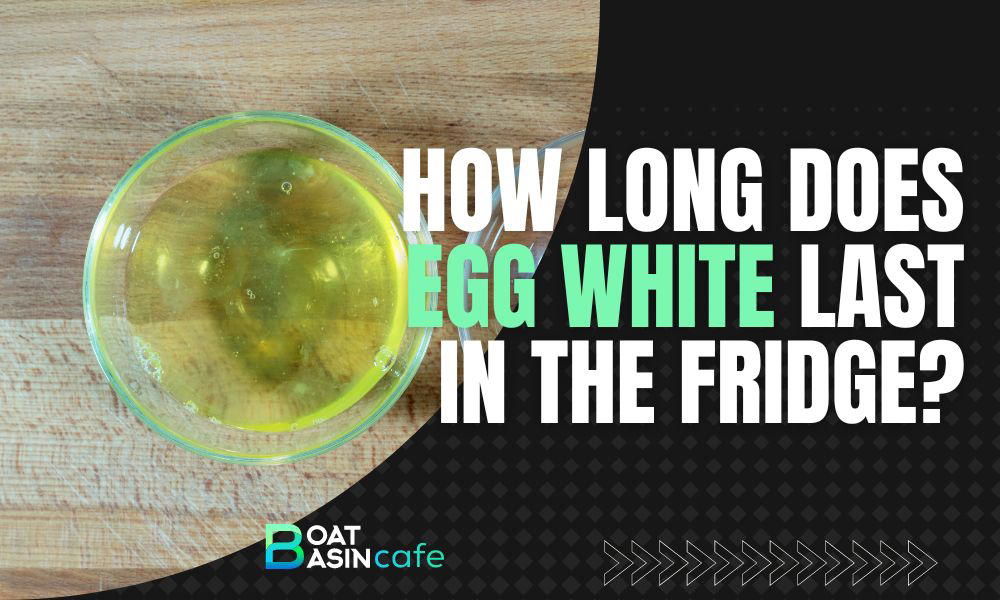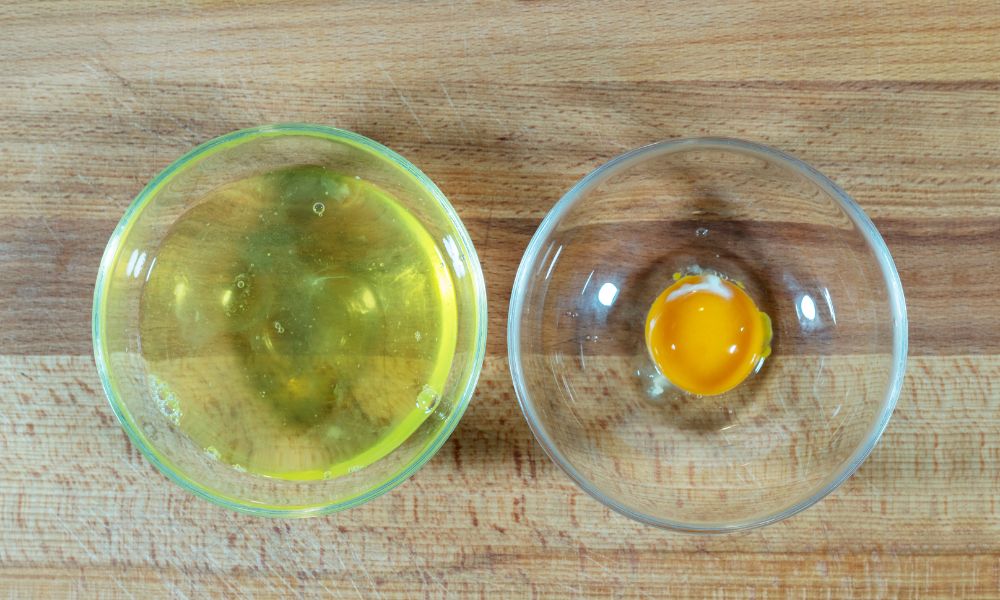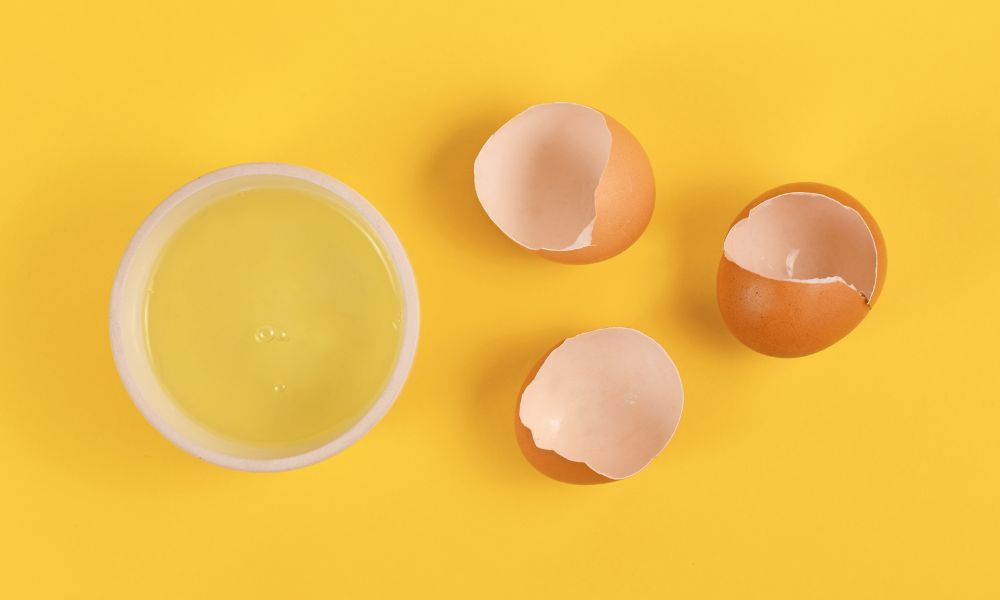Have you ever wondered how long egg white lasts in the fridge? Look no further! In our comprehensive guide, we delve into the world of egg white storage, exploring shelf life, proper techniques, and even creative ways to use up leftover egg whites. Master the art of egg white storage and never worry about waste or safety concerns again!

The Shelf Life of Egg Whites
Egg whites, like any other perishable food, have a shelf life that depends on various factors such as storage condition and type. So, how long do egg whites last? This can vary significantly but typically, raw egg whites can last between 2-4 days in the fridge, while pasteurized egg whites have a longer shelf life of up to 10 days.
Refrigeration is essential for egg white storage as it helps slow down the growth of bacteria and maintain freshness. However, the shelf life can also be influenced by factors such as the age of the egg or how the whites were extracted.
There are three main types of egg whites you might store:
- Raw egg whites: These are the regular egg whites extracted from eggs cracked at home. Raw egg whites’ shelf life is shorter, around 2-4 days in the fridge.
- Pasteurized egg whites: These are egg whites that have undergone a heating process to reduce bacteria and pathogens, making them safer to use. Pasteurized egg whites have a longer shelf life, typically 7-10 days in the fridge.
- Powdered egg whites: Dehydrated egg white powder is shelf-stable and can last for months if stored in an airtight container at room temperature. However, once reconstituted with water, treat them like fresh egg whites and consume them within 2-4 days.
Signs of Spoiled Egg Whites

Identifying spoiled egg whites is an important skill to ensure that you’re using safe ingredients in your recipes. Here are some of the telltale signs that your egg whites have gone bad:
- Visual: Spoiled egg whites may become cloudy, yellow, or develop a pink or green hue. Any discoloration or visible mold is a definite indicator that your egg whites have gone bad.
- Olfactory: Smell your egg whites for any off odors. Fresh egg whites should have a mild, neutral scent, while spoiled egg whites may have a sour or rotten smell.
- Texture: Fresh egg whites should be smooth and slightly viscous. If your egg whites are slimy, lumpy, or have lost their viscosity, it’s time to discard them.
It’s essential to inspect your egg whites before using them in recipes, regardless of the expiration date, to ensure they are safe for consumption.
Proper Storage Techniques
To get the most out of your egg whites, it’s crucial to store them properly. Here’s a step-by-step guide on storing egg whites in the fridge for optimal freshness:
- Choose the right container: Select a clean, airtight container made from food-safe materials such as glass or plastic. The best containers for storing egg whites should be moisture-resistant and easy to clean.
- Transfer the egg whites: Gently pour the egg whites into the container, ensuring that the yolk or any bits of shell don’t contaminate the whites. Keep in mind that using a funnel can help prevent spills.
- Secure the lid: Make sure the container is sealed tightly to keep air and bacteria out. Pressing plastic wrap onto the surface of the egg whites can also help prevent oxidization.
- Label and date: Use a permanent marker or label to write the date on the container. This will help you track how long the egg whites have been stored and make it easy to determine when it’s time to discard them.
- Place in the fridge: Store the container on a middle or lower shelf in the refrigerator, away from strong-smelling foods. Avoid placing them in the door where temperature fluctuations are more significant.
Extending the Lifespan of Egg Whites

If you want to store your egg whites for longer than a week, freezing egg whites can be an excellent option. It not only extends their shelf life but also allows you to have a supply of egg whites on hand for recipes that call for them. Here’s an experiment I tried and recommend for freezing egg whites in ice cube trays:
- Prep the ice cube trays: Lightly coat the ice cube trays with non-stick cooking spray so the egg whites can easily be removed later.
- Fill the trays: Pour the egg whites into individual compartments of the ice cube tray, filling them only about three-quarters full to account for expansion as they freeze. One standard ice cube compartment holds roughly one egg white.
- Freeze: Place the ice cube trays in the freezer, laying them flat to ensure even freezing. Freeze the egg whites until they are solid, typically 4-6 hours.
- Transfer and store: Remove the frozen egg white cubes from the tray and transfer them into an airtight freezer bag or container. Store the container in the freezer for up to 12 months.
To use the frozen egg whites, simply remove the necessary number of cubes from the container and thaw them in the refrigerator before use. Thawed egg whites can be used for baking, cooking, or whipping into frothy delights like meringues or soufflés.
This is just a part of the complete content. Read the complete article on How to Effectively Store and Freeze Egg Whites for Long-term Use.
Creative Uses for Leftover Egg Whites
Don’t let those leftover egg whites go to waste! Instead, try using them in a variety of creative recipes that showcase their versatility and nutritious benefits. Here are some ideas and egg white recipes to help you use up those extra whites:
- Whip up some meringues: One of the most popular egg white recipes, meringues are light, crispy treats made by whipping egg whites with sugar to create stiff peaks.
- Make a soufflé: Classic soufflés are made by folding whipped egg whites into a flavored base and then baking it to achieve a fluffy, airy texture.
- Bake an angel food cake: Angel food cake is a light, spongy dessert that relies on whipped egg whites for its signature airy texture.
- Prepare a pavlova: This elegant dessert combines baked meringue, whipped cream, and fresh fruit for a delicious, crowd-pleasing result.
- Use as a binder in meatballs or veggie patties: Egg whites can act as a binder in recipes like meatballs or veggie patties, helping hold them together and giving structure.
Remember that egg whites can be a fantastic addition to your culinary repertoire, and exploring various creative recipes will help you enjoy their benefits while preventing waste.
FAQs
How long can you keep egg whites in the fridge?
Raw egg whites can generally last between 2-4 days in the fridge, while pasteurized egg whites have a longer shelf life of up to 10 days. For optimal freshness, store the egg whites in an airtight container and check for signs of spoilage before using them.
Can I freeze egg whites for later use?
Yes! Freezing egg whites is an excellent way to extend their shelf life and have them on hand for future recipes. Use ice cube trays to freeze individual portions, then store the frozen cubes in an airtight container or freezer bag. Frozen egg whites can be kept in the freezer for up to 12 months.
Are there any safety risks associated with using expired egg whites?
Using expired egg whites can pose several risks, such as foodborne illnesses caused by bacteria like Salmonella or food spoilage due to the presence of mold. Always inspect and smell your egg whites to ensure they are safe for consumption.
Can I use egg whites past their expiration date for baking or cooking?
It’s not recommended to use egg whites past their expiration date, as this increases the risk of foodborne illnesses or food spoilage. However, if the egg whites still appear visually and olfactorily fresh, you may choose to use them at your own discretion. For peace of mind, always use fresh, non-expired egg whites in your recipes.
How can I tell if egg whites have gone bad?
Pay attention to the visual, olfactory, and textural indicators of spoiled egg whites. Watch for discoloration, off odors, sliminess, or lumps, as these are signs that your egg whites have gone bad and should not be consumed.
Is it safe to consume raw egg whites?
While raw egg whites are commonly used in some recipes, they can pose a potential risk of Salmonella infection. To mitigate this risk, use pasteurized egg whites if you plan to consume them raw, such as in smoothies or salad dressings.
Can I store egg whites in the freezer instead of the fridge?
Absolutely! Storing egg whites in the freezer instead of the fridge is a great way to extend their shelf life. Properly frozen egg whites can last up to 12 months in the freezer.
Conclusion
Proper egg white storage is essential for maintaining freshness, ensuring safety, and preventing food waste. By following the guidelines provided in this guide, you’ll be well-equipped to store your egg whites effectively and confidently. From refrigerating to freezing, labeling, and even repurposing leftover egg whites, you’ll now be able to make the most out of this versatile and nutritious ingredient in your kitchen.
Remember, always inspect your egg whites before using them in recipes and do not hesitate to experiment with creative uses for those extra whites. By adhering to proper storage techniques and extending the shelf life if needed, you’ll maximize the potential of your egg whites and delight in the delicious results.








